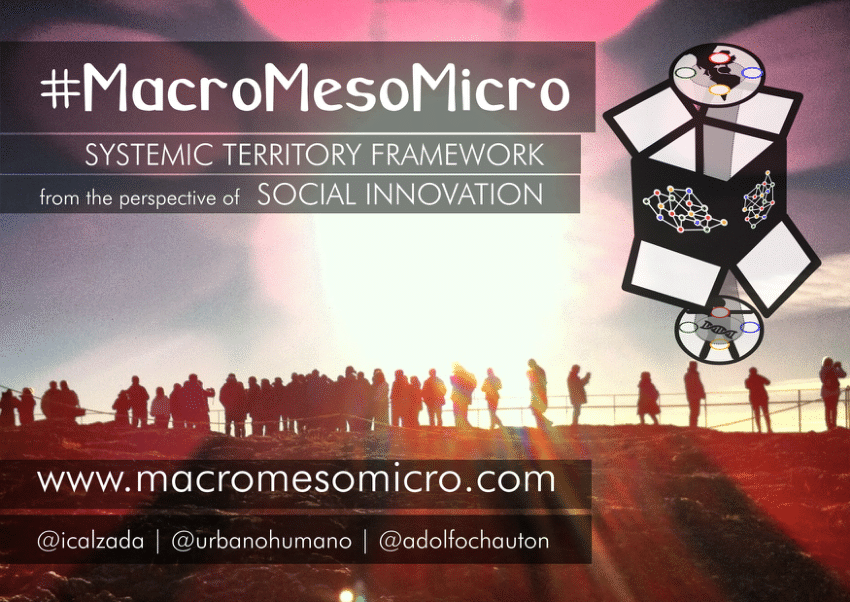Globalization and Its Effects on Our Relationship with the Territory
Summary
Globalization has normalized a lifestyle detached from the local dimension, generating a disconnect from our social identity and the reality of territories. The promotion of new knowledge spaces along with dynamics of situated collective intelligence signals a trend reversal.
Keywords
Globalization, Territory, Situated Collective Intelligence
The rise of globalization processes, and in general, the growing power of the financial ecosystem over the vital dynamics of territories, has reduced the ability of most people to see themselves as protagonists of a reality perceived as distant from their everyday life. Western society has gradually forgotten its situated dimension and contextually conditioned by the physical space, changing its way of inhabiting, in its most social, relational, economic, and political essence.
“The development of globalization, the internationalization of companies and economies, the globalization of markets, the speed in transmitting information and knowledge, the mobility of people, capital, goods, and services, have made us live in a world dominated by a series of flows that have displaced the characteristic places that served us as reference. Globalization entails continuous delocalizations and relocalizations of economic activities, creating a new order and world system. The economic, social, cultural, and political scenarios are transformed, rapidly and radically.”
Francisco Javier Gómez Piñeiro (2006)
Globalization has gradually detached our day-to-day life from our nearest reality, whose present and future depend on the decisions of a few people.
How have we reached this strange condition of “territory-less” inhabitants?
It is worth reflecting on three elements or dimensions: consumption, lightness, and speed.
CONSUMPTION
In the early Seventies, Italian journalist and writer Pier Paolo Pasolini already denounced what he described as the new totalitarianism generated by the consumer society. He explained that behind an apparent absolute freedom, there was a totalizing and subtle will of unprecedented homogenization in history.
“No fascist centralism has achieved what the centralism of the consumer civilization has done. Fascism proposed a model, reactionary and monumental, but it remained a dead letter. The various special cultures (peasant, sub-proletarian, worker) continued undisturbed according to their old models: repression was limited to obtaining their verbal adherence. Today, on the other hand, adherence to the models imposed by the Center is unconditional.”
Pier Paolo Pasolini (1973)
Pasolini was particularly concerned about the cultural impoverishment generated by globalization, and the deterioration of our relationship with local reality in favor of that homogenization, associated with a “new” globalized reality based on consumption.
This global lifestyle emphasizes freedom and individual independence, leading to a process by which people lose contact with their own neighbors, concerned above all with earning the money that allows them to achieve, through consumption, this new “freedom” and “independence”. As a result, well-being begins to be understood as detached from our belonging to a community or territory. Everything seems to depend on our economic resources and much less on our ability to collaborate and relate to neighbors.
LIGHTNESS
Technological evolution and new digital communication ecosystems, along with the transformation of the global economy and the world of work, have allowed us to break physical barriers and spatial limits. Today, the territory “weighs” much less than 50 years ago.
In this context, a new condition of lightness regarding our ability to move further distances us from the territories we inhabit.
With the labor market demanding more and more flexibility, and new technologies expanding our ability to develop and maintain social relationships even many kilometers away, our predisposition to move and avoid any kind of attachment to a territory grows.
We have renounced involvement in local projects and lost any relationship with local social groups. We have also stripped ourselves of any direct responsibility in the dynamics of territory management, taking advantage of the democratic infrastructure that allows us to delegate to the public administration and private companies.
We feel lighter and live in a deterritorialized reality.
SPEED
Our pace of life, as well as the speed of economic and social transformations, conditions our perception of reality. We have become accustomed and adapted to a constantly changing condition. We move from one city to another, almost without thinking, just as we quickly move from one phase to another of our life cycle.
Paul Virilio in the Nineties, speaking of the effects of progress, specifically of cyberspace, reflected on speed and the concept of real-time and unique time, understanding it as the definitive destruction of real space: a kind of domination of the temporal dimension over the physical dimension. “If time is money, then speed is power,” he said.
The word globalization is a farce. There is no globalization, only virtualization. What is effectively being globalized is time.
[…] For the first time, history will be revealed within a system of unique time: global time. Until now, history has taken place within local times, local structures, regions, and nations. But now, in a way,
globalization and virtualization are inaugurating a universal time that prefigures a new form of tyranny.
[…] Thus, we see on the one hand real-time replacing real space. On the other hand, we have global time, belonging to multimedia, to cyberspace, incredibly dominating the structure of the local time of our cities, our neighborhoods.
Paul Virilio (1993)
Progress has replaced our neighborhood with the global village.
SOCIAL IDENTITY, WORK, AND TERRITORY
Production processes, whether related to knowledge, services, or material goods, have been structured following a global logic to the detriment of any other local condition or need.
Pierre Levy in the Nineties spoke to us about the effects of globalization on the development of our social identity and its relationship with work and territory. For this, he introduced the concept of anthropological space, understood as the space of the flows of goods, where the fundamental activities can be grouped into three major categories: production, transaction, and communication. According to Levy, in this ecosystem, each person’s identity is directly conditioned by the professional role they cover in one of these three categories. Therefore, our social identity is largely defined by our work, which in most cases is salaried work and therefore strongly dependent on economic mechanisms over which most people are never called to opine.
The result, once again, is a disconnect of our social identity from the reality of our territories, at the service of a globalized economic-productive mechanism.
Consumption, lightness, and speed, however, have another reading when we analyze them from a perspective centered on the production and exchange of knowledge. The speed and ease with which we exchange information today, along with the elimination of intermediaries, allow us to experiment with processes of collective intelligence. The social implications are enormous, as they promote a change in the definition and perception of personal identity that becomes directly linked to the knowledge that each person has.
Identities then become knowledge identities. The ethical consequences of this new institution of subjectivity are immense: who is the other? It is someone who knows. And who knows, moreover, things that I do not know. The other is no longer a horrible, threatening being: like me, he ignores much and dominates certain knowledge.
Pierre Levy 1994
According to Levy, we are promoting a new space of knowledge that is activated thanks to the experimentation of new human relationships based on the valorization of their knowledge and skills, without the need to resort to a classification imposed by belonging to a certain social, professional, or economic category.
SITUATED COLLECTIVE INTELLIGENCE
Today we can expand the concept of knowledge space with Ambient intelligence or Synergy Ecosystem, which describes a local context (environment) characterized by its constant connection capacity between space, time, people, and the information layer (digital dimension). Specifically, this type of “environment” promotes the exchange of information and knowledge and the encounter between people, facilitating the creation of synergies that materialize in collaborative projects with local impact. The result is dynamics of situated collective intelligence, where the inhabitants of a territory in constant connection, self-organize to activate processes of transformation and management, based on collaboration, inclusivity, and transparency. A new citizenship emerges that takes care of its territory again, starting from local relationships, from people, common interests, and the common good, outside of partisanship and the rules imposed by the market.
CONCLUSION
We have seen how globalization has normalized a lifestyle fundamentally detached from local realities. Factors such as consumption, lightness, and speed have contributed to detaching our lifestyle and well-being model from belonging to a territory and a local community. Everything seems to depend on our economic capacity and much less on our ability to collaborate and relate to neighbors. However, in recent years practices have emerged that promote a new condition of life where everyday activities are again related to the dynamics that characterize the identity of the places we inhabit. We begin to rediscover the territory and the communities of which we are a part, generating new synergy ecosystems where space, time, people, and the information layer are continuously connected.
A new process of “glocalization” emerges where the valorization of the local dimension occurs without forgetting the advantages of being constantly “connected” to more global phenomena and dynamics. In short, we are talking about processes of Situated Collective Intelligence that use global knowledge to activate collective processes, strongly localized and conditioned by local realities.
BIBLIOGRAPHY
PASOLINI, Pier Paolo. Scritti Corsari. Milan: Aldo Garzanti Editore, 1975
VIRILIO, Paul. L’art du moteur. Paris: Editions Galilée, 1993
LEVY, Pierre. L’Intelligence collective. Pour une anthropologie du cyberespace. Paris: La Découverte (Essais), 1994
AGUILAR GARCÍA, Teresa. Ontología Cyborg: El cuerpo en la nueva sociedad tecnológica. Barcelona
You may also like
MacroMesoMicro. Systemic Territory Framework from the perspective of the Social Innovation
This publication aims to take a step back to gain momentum and propose, by unfolding, a Systemic Fra
Domenico Di Siena on the Dynamics of Collective Intelligence
A year ago, I received an invitation from Amalio Rey to answer a series of questions about Collectiv
Bridging the Gaps: Unveiling the Interconnected Realms of Civic Life
For several years now, I have been immersed in doctoral research. Initially, I focused on physical-d






Post a comment